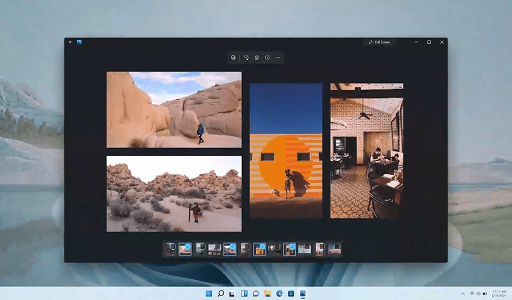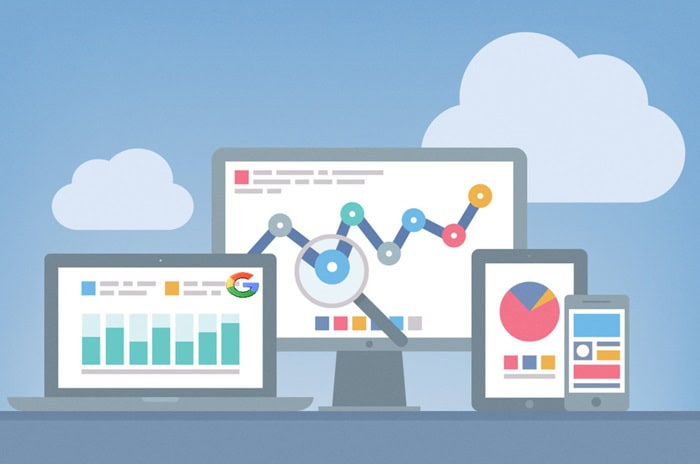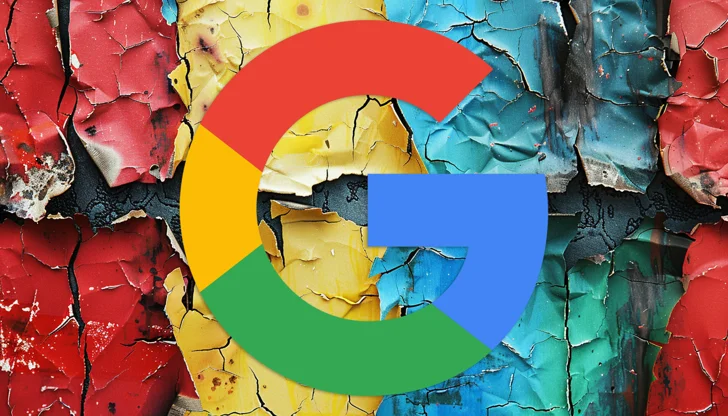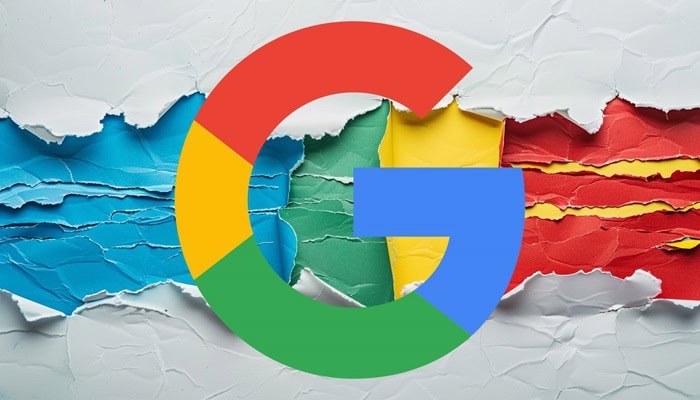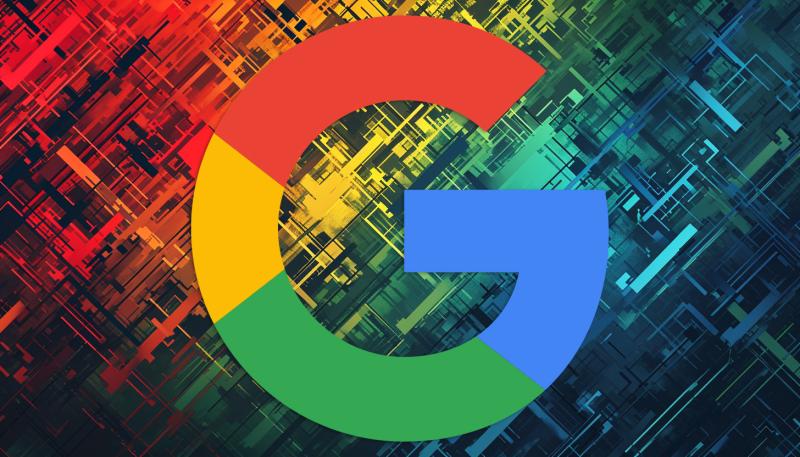Google’s latest algorithm quickly weeds out low-quality websites from search results, with anecdotal evidence hinting at a surge in affected sites comparable to the historical impact of the Panda and Penguin updates.
Google March 2024 Update On Manual Actions
Having witnessed every Google update, We confidently assert that the March 2024 Core Algorithm Update rivals the Florida, Panda, and Penguin updates in its sweeping force. Conversations with professional marketers affirm this update’s significance, placing it among the major milestones.

While the Medic update signaled a change, the current developments represent more than a singular upheaval. They signify a fundamental transformation in ranking criteria. Thus, analyzing the penalized content provides insight into the magnitude of this update.
No Respite for Sites That Weathered Previous Updates
Social media posts reveal Google’s sweeping removal of entire websites from both search results and indexes. Some celebrate the eradication of low-quality sites that managed to persist through previous Google updates, while others, particularly publishers, express bewilderment over the disappearance of their entire site networks.
In a post within the confidential Affiliate SEO Mastermind group, a publisher shares the distressing experience of their entire network’s collapse.
The post’s important details reveal that all eight impacted sites were established within the last two years, each centering on a distinct niche topic. The author asserts that the content was predominantly manually created with minimal AI assistance. Despite their efforts, all websites register zero traffic impressions.
A potential insight into the sites’ vulnerability lies in their divergence across several topics, suggesting a lack of the profound topical expertise favored by Google. The individual behind the Facebook post conveys a decision to relinquish their efforts, redirecting focus towards YouTube for future strategies.
MarketMuse’s Jeff Coyle tweeted about a cluster of sites, monitored as a measure of Google’s search algorithm effectiveness, which was recently delisted from the search engine results pages (SERPs).
Jeff tweeted:
“I was checking out a pool of SERPs I monitor for a collection of horrible spam sites that have been present and creeping around for 12-18 months. Many are completely deindexed, and others are hidden in filter=0 or literally bunched up at the bottom (the actual bottom, like the last findable URLs) of the SERP.”
@barelypurple responded to Jeff’s tweet:
“Some pure garbage getting demolished which is great but my main concern is that we’ll just see big sites getting even more traction.”
The Penalties
An intriguing aspect of this update is the fast issuance of manual actions against websites.
@ratneshkumar684 tweeted:
“It seems @googlesearchc is very fast to implement the spam update this time.
One of my friend’s site got completely deindexed today morning.
Just now he received this manual penalty affecting all the pages.
The site was publishing news in the entertainment niche.”
Screenshot Of Manual Action Notification

Gael Breton tweeted:
“I’m seeing AI spam sites getting fully deindexed left and right right now.
It’s going to get interesting”
@PureAffiliate responded with a tweet about a self-described “link building agency” that was eliminated from Google’s search results.

Discrepancies in Manual Action Communication
Jeannie Hill (@essentialskill) highlighted cases where businesses sought her assistance, noting inconsistencies in Google’s communication regarding manual actions. While some received email notifications, others discovered the action only through their Google Search Console. Intriguingly, one instance saw a traffic decline preceding the notification in the search console.
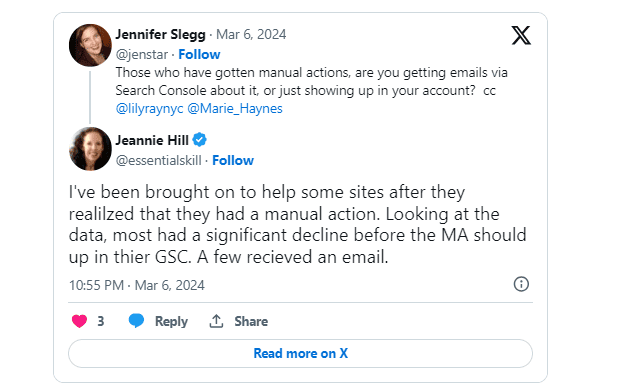
Ollie Ryman (@ollie_ryman) remarked on manual actions concerning “abusive experiences,” noting their absence from Google Search Console with notifications solely delivered via email.
Ollie’s tweet:
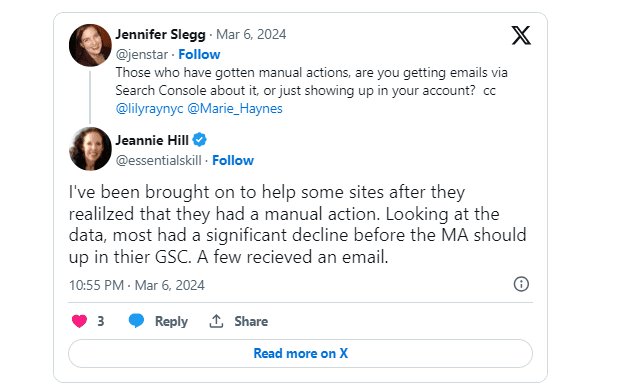
@tonythill mentioned that everyone he inquired about regarding their manual action stated they did not receive an email notification.
Even Small AI Content Sites Face Manual Action
According to a Twitter user’s suggestion, Google can identify AI-generated content through the rapid publication of a significant volume of content within a short timeframe.
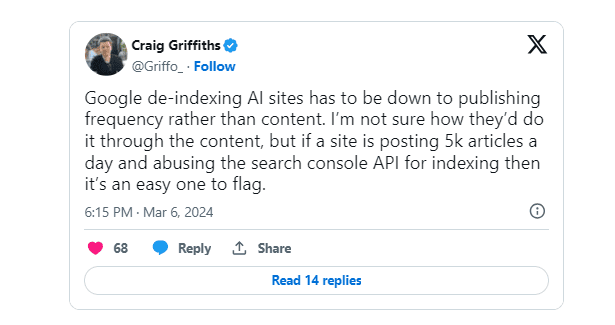
This shows that publishing speed can flag a spam site for identification accuracy. However, an overarching observation may downplay Google’s proficiency in detecting AI-generated content, as per a response to the aforementioned tweet.
@PeteReynolds_ replied to the preceding tweet, recounting his firsthand encounter with a small site housing AI-generated content, which, despite not vying for visibility and merely existing passively, incurred a manual action.
Pete’s tweet:
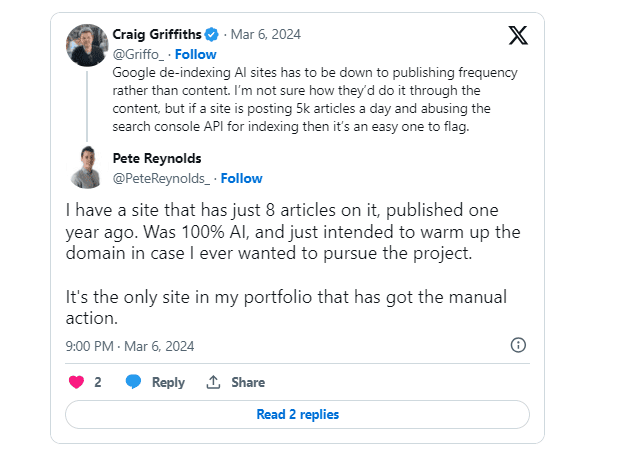
Another factor to take into account is that statistical analysis relies on more than just a single data point, such as the pace of content publication. The precision of statistical analysis improves significantly with multiple data points, a characteristic that has been integral to search engine statistical analysis for nearly two decades.
Sites Facing Manual Actions
Another aspect of this update is its impact on older sites that have not previously encountered manual actions.
@simransingh931 tweeted:
“Even one of our websites got hit with a manual penalty.
I started it in 2013, a brand new domain, that ranked well and was receiving good traffic over the years. Today I got a manual penalty for it.
No Spam, Articles written by trusted authors, everything from screenshots to content was our own.
I thought it was just us, but searched and found this and a few other threads.”
What You Need To Considered Before Manual Action
The widespread occurrence of manual actions reported within the search marketing community affirms Google’s assertion that the update represents a significant alteration to their ranking systems and algorithms.
Historically, updates like Florida, Panda, and Penguin showed new technologies, exposing vulnerabilities in prevailing SEO strategies. In response, search marketers underwent a period of recalibration to discern the optimal path forward.
This update’s rollout spans a full month. In my view, it’s advisable to acquaint oneself with sites subject to manual actions to discern common patterns among penalized sites. However, it’s important to remember that the most apparent issue isn’t always the most critical one. The entire search marketing industry stands poised, observing intently.
Would you like to read more about “Google March 2024 Update On Manual Actions” related articles? If so, we invite you to take a look at our other tech topics before you leave!
Use our Internet marketing service to help you rank on the first page of SERP.
![]()







